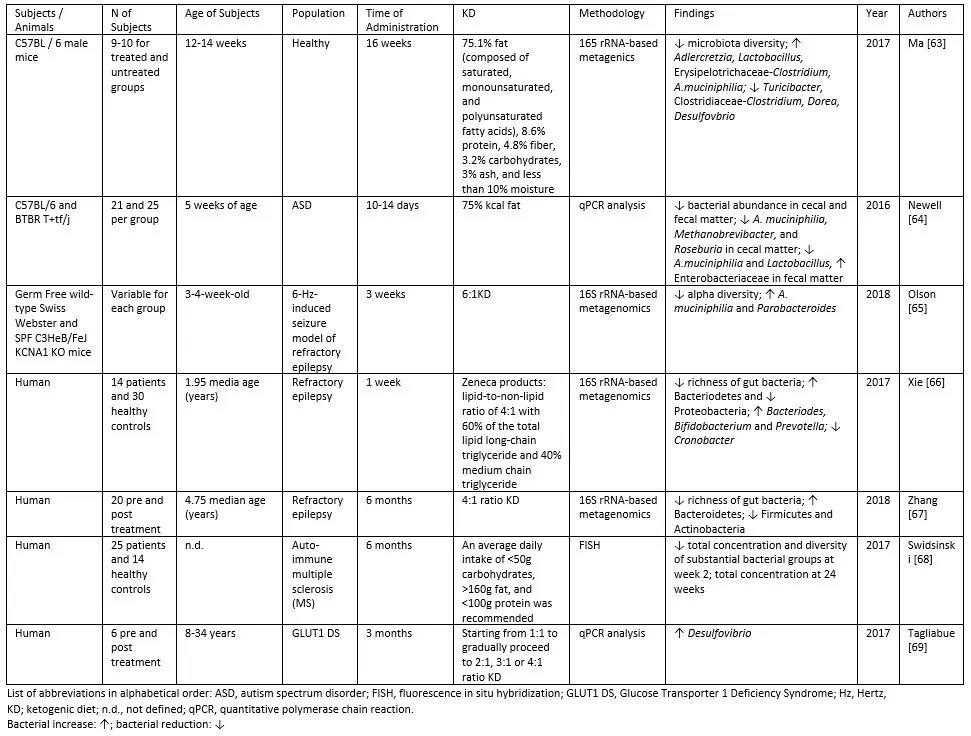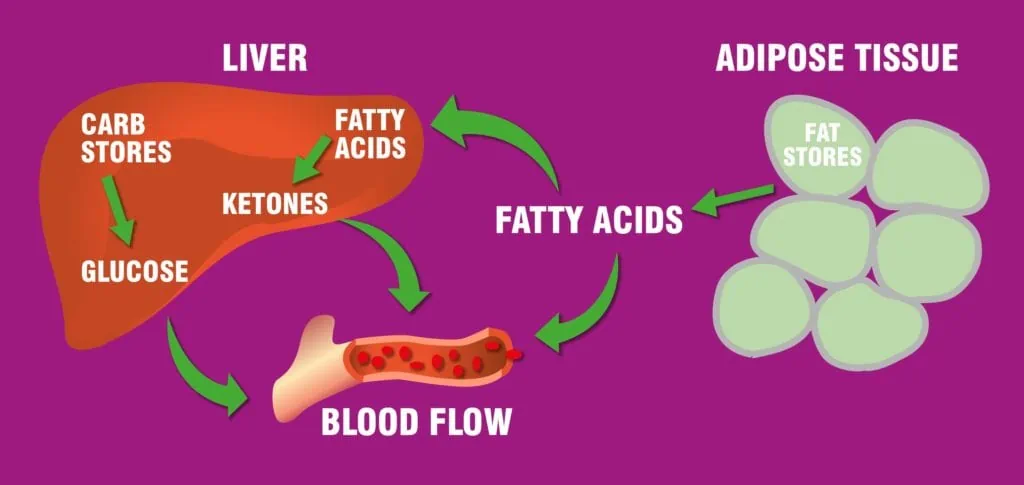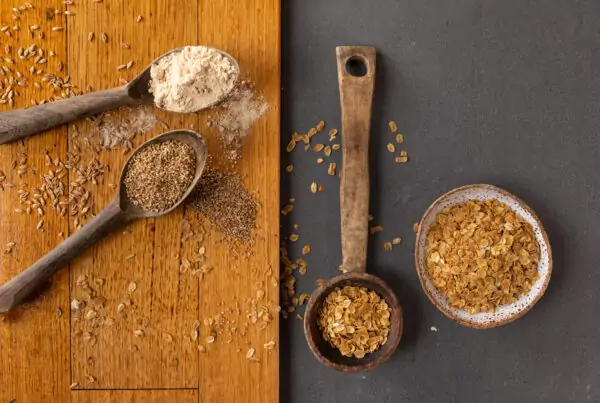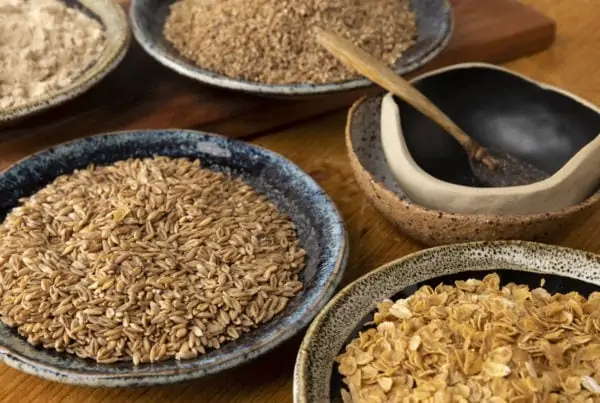In the 1920s and ‘30s, the ketogenic diet was popular as a method to treat epilepsy, until medication took over and more people with epilepsy turned to anticonvulsant medication to treat seizures. 1 By mostly consuming fat and severely restricting carbohydrate and protein intake, the body is forced to burn fat as its main energy source. This is achieved by the liver converting fats into fatty acids and ketones, that are then fed into the blood supply. This results in an elevated level of ketones in the blood (ketosis is usually confirmed when blood ketone levels are greater than 0.5 mmol/L), and it is when the body is in a ketotic state, that a reduction in the frequency of epileptic seizures, specifically in children, has occurred. 1,2
Breakdown of fat stores on a ketogenic diet
Whilst the ketogenic diet got its start as a treatment for epilepsy, today its more of a popular tool for weight management, thanks to ongoing research looking at the ketogenic diet for obesity management. 3 Of course it’s not only the white-coated scientists that are interested in the possible weight loss benefits of the ketogenic diet, but also the millions on Instagram and other social media sites that are only too eager to listen to the ‘wellness warriors’, who tout the keto diet as an ultimate solution to achieve the perfect Insta bikini body.
Over 12 million posts for #keto on Instagram
The Ketogenic Diet (or KD as it is commonly referred to), has been shown to be somewhat effective, at least in the short term, as a tool to fight obesity. But like many diets, the effectiveness for long term weight management is not well established. 4,5 There are also concerns that if followed strictly on a long-term basis, KD could cause kidney damage, micronutrient deficiencies and even potentially severe hyperlipidemia.
On the flip side, KD may improve blood lipids by reducing total cholesterol and increasing prevalence of HDL, and there have been reports of improvements for neurological diseases such as Alzheimers and multiple sclerosis when following this diet regime. 6,7,8
Keto and Gut Health
With the increased interest in gut health and the microbiome, it is interesting to take a look at the research on the effects of KD on the gut bacteria. A number of studies have investigated the composition of the gut microbiome on KD and the findings are shown in the table below. Whilst gut microbial diversity appears to decrease in mice eating a keto diet, there is an increased prevalence of beneficial gut microbes and a reduction of pro-inflammatory taxa. 9 In another study of children affected by refractory epilepsy, after 6 months of treatment with KD, the fecal microbiota profiles showed lower diversity after KD therapy and significantly decreased abundance of Firmicutes and increased levels of Bacteroidetes. 10 Therefore specific gut microbiota may serve as an efficiency biomarker and a potential therapeutic target in patients with refractory epilepsy.
In the study of Swidsinski and co-workers, the colonic microbiome was investigated in an auto-immune multiple sclerosis cohort of patients during KD treatment. The effects of a KD in the short term produced a reduction of bacterial concentrations and diversity. After 6 months, an inverse effect was registered with a bacterial richness significantly increased and a restoring in bacterial biofermentative functions, markedly impaired in multiple sclerosis patients. Therefore, it appeared that a KD normalized concentrations and functions of the colonic microbiome after 6 months of treatment. 11
Main findings related to the effect of ketogenic diet (KD) on gut microbiota

How Much Carbohydrate?
The classic KD is based on a ratio of fat to carbohydrate plus protein grams of 3:1 or 4:1, which means that 90% of the energy comes from fat and only 10% from carbohydrate and protein combined mixture. In practise, this means that total carbohydrate intake is reduced to less than 50 grams a day—less than the amount found in a medium plain bagel—and can be as low as 20 grams a day. The protein amount on the ketogenic diet is kept moderate in comparison with other low-carb high-protein diets, because eating too much protein could prevent ketosis, as amino acids in protein can be converted to glucose.
One of the common controversies around the KD is the low intake of carbohydrate as there is no prescriptive amount given the individual variability in achieving ketosis. There are also many advocates of KD that advise that one only needs to focus on “net carbs”, which are loosely defined as “total carbohydrate minus the fibre”, and excludes fibres that are resistant to digestion (e.g. resistant starch). Controversies aside, the real challenge for the average person is more likely the ability to maintain such a severe form of carbohydrate restriction for any length of time. And for many, even a small amount of carbohydrate will switch their body out of a ketotic state and any potential benefits of this diet will be negated. Of course there are many other negatives that come with a severe form of carbohydrate avoidance, including loss of key nutrients from whole grain foods, which I discussed in this previous article about the LCHF diet.
The ketogenic diet is one of the many diets in the ever-changing but never-ending macronutrient battlefield. I think one of the good points of the diet is dispelling fear of fat that was around for so many decades, although the fear factor has probably just switched to sugar. Like all diets, it is important to ascertain the benefits verse the disadvantages for the individual and to focus on the long term end goal and not just the quick wins.
Teri Lichtenstein APD
References:
- Freeman JM, Kossoff EH, Hartman AL. The ketogenic diet: one decade later. Pediatrics. 2007 Mar;119(3):535–43. doi:10.1542/peds.2006-2447. PMID
- Martin-McGill KJ, Jackson CF, Bresnahan R, Levy RG, Cooper PN. Ketogenic diets for drug-resistant epilepsy. Cochrane Database Syst Rev. 2018 Nov 7;11:CD001903. doi:10.1002/14651858.CD001903.pub4. PMID 30403286
- Paoli A. Ketogenic diet for obesity: friend or foe? Int J Environ Res Public Health. 2014 Feb 19;11(2):2092-107. doi: 10.3390/ijerph110202092. PubMed PMID: 24557522; PubMed Central PMCID: PMC3945587.
- Bueno NB, de Melo IS, de Oliveira SL, da Rocha Ataide Very-low-carbohydrate ketogenic diet v. low-fat diet for long-term weight loss: a meta-analysis of randomised controlled trials. T Br J Nutr. 2013 Oct; 110(7):1178-87.
- Freedman MR, King J, Kennedy E Obes Popular diets: a scientific review. 2001 Mar; 9 Suppl 1():1S-40S.
- Tony David K, Divyanjali P, Sai Krishna G. Ketogenic diet in the management of diabetes. Indo Am J Pharm Res. 2017;7:8109–15.
- Study of the ketogenic agent AC-1202 in mild to moderate Alzheimer’s disease: a randomized, double-blind, placebo-controlled, multicenter trial. Henderson ST, Vogel JL, Barr LJ, Garvin F, Jones JJ, Costantini LC Nutr Metab (Lond). 2009 Aug 10; 6():31
- Choi, I.Y.; Piccio, L.; Childress, P.; Bollman, B.; Ghosh, A.; Brandhorst, S.; Suarez, J.; Michalsen, A.; Cross, A.H.; Morgan, T.E.; et al. A Diet Mimicking Fasting Promotes Regeneration and Reduces Autoimmunity and Multiple Sclerosis Symptoms. Cell Rep. 2016, 15, 2136–2146. [CrossRef] [PubMed]
- Ma, D.; Wang, A.C.; Parikh, I.; Green, S.J.; Hoffman, J.D.; Chlipala, G.; Murphy, M.P.; Sokola, B.S.; Bauer, B.; Hartz, A.M.S.; et al. Ketogenic diet enhances neurovascular function with altered gut microbiome in young healthy mice. Rep. 2018. [CrossRef] [PubMed]
- Zhang, Y.; Zhou, S.; Zhou, Y.; Yu, L.; Zhang, L.; Wang, Y. Altered gut microbiome composition in children with refractory epilepsy after ketogenic diet. Epilepsy Res. 2018, 145, 163–168.
- Swidsinski, A.; Dörffel, Y.; Loening-Baucke, V.; Gille, C.; Göktas, Ö.; Reißhauer, A.; Neuhaus, J.; Weylandt, K.-H.; Guschin, A.; Bock, M. Reduced Mass and Diversity of the Colonic Microbiome in Patients with Multiple Sclerosis and Their Improvement with Ketogenic Diet. Microbiol. 2017.
Intended as general advice only. Consult your health care professional to discuss any specific concerns.









2 Comments